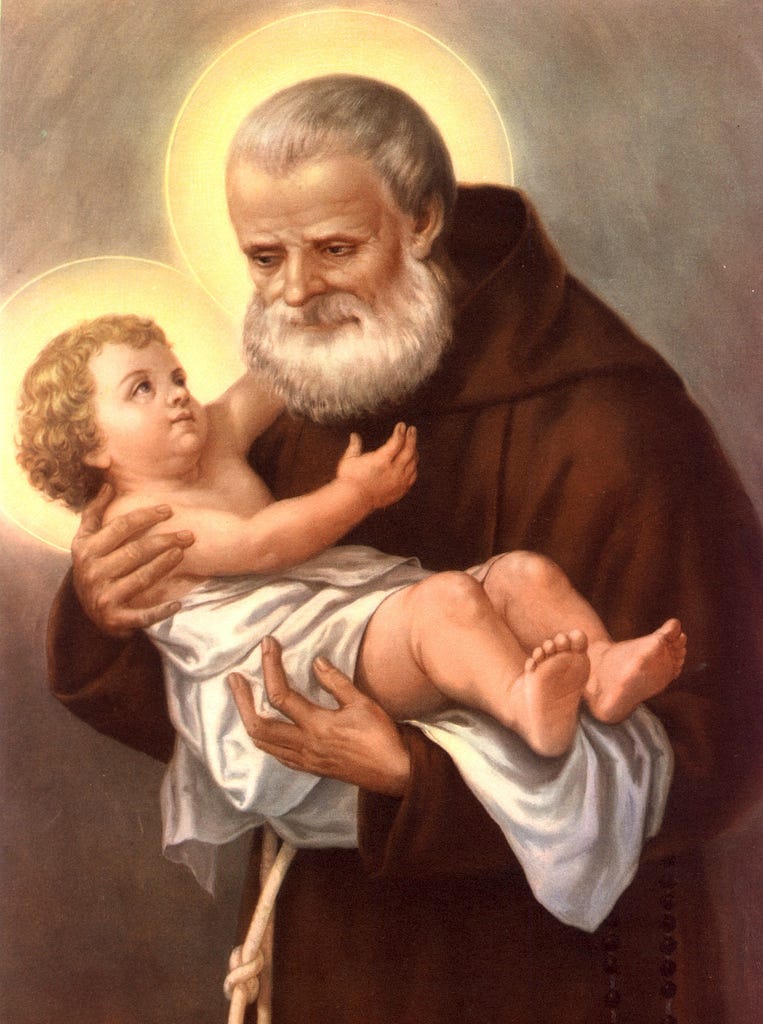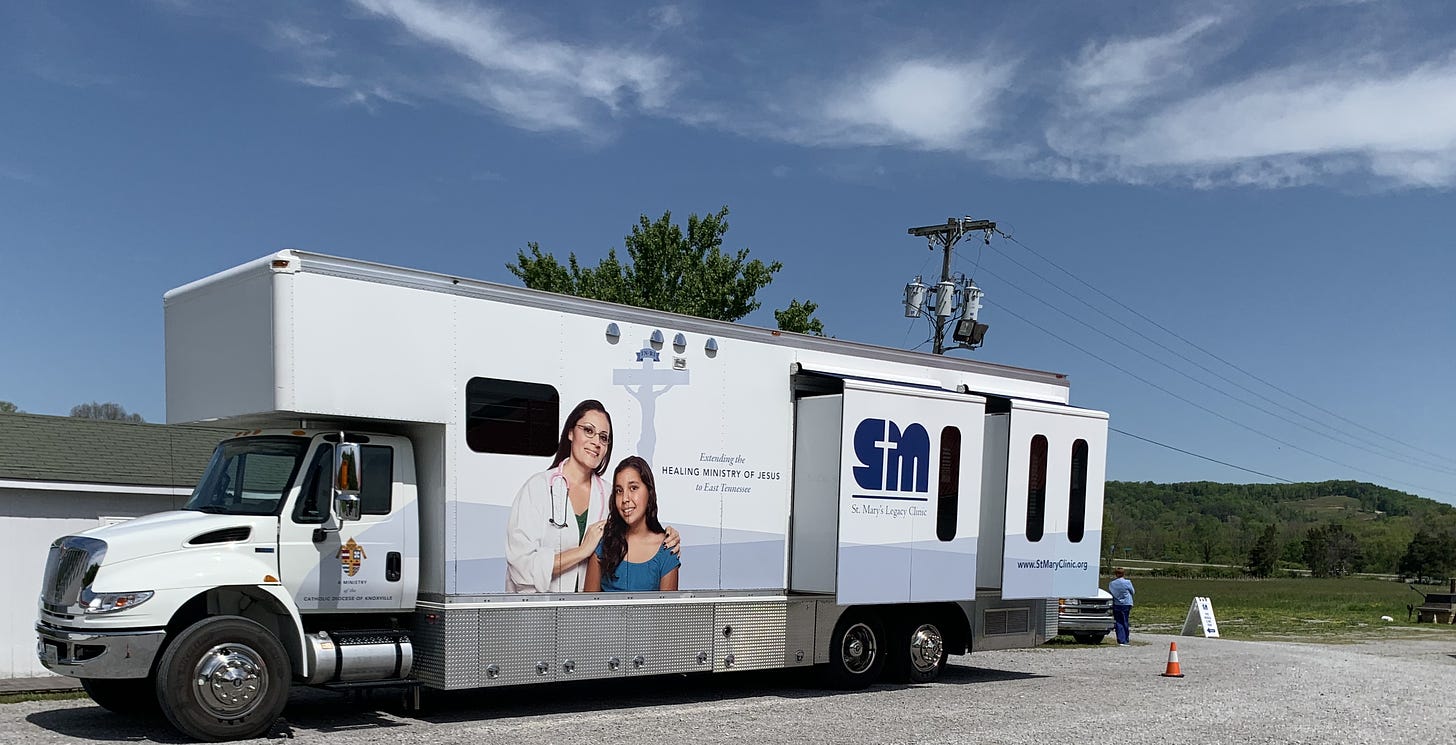Hey everybody,
Today the Church celebrates the feast of Brother Deo Gratias — Brother Thanks be to God — a saint we can all try to emulate.
His name was Felix. He spent 40 years as a Capuchin brother living in Rome, assigned as his friary’s questor — it was Br. Felix’s job to walk the streets, knocking on doors, begging food for the friary and money for the poor.
Felix was well known in certain Roman neighborhoods — especially the richest ones, where he begged for things, and the poorest ones, where he gave them away.
He greeted each person, rich or poor, the same way: “Deo Gratias.” Eventually, the greeting became his nickname.
His Capuchin brothers didn’t quite know the extent of his ministry in the streets of Rome until his funeral in 1587. Crowds came to mourn him, they waited in line for hours. Noblemen and women said he had converted them to Christ. Cardinals, and even Pope Sixtus V, gave sermons extolling his holiness.
The Caps…well, they just knew he was Felix. They had no idea what he meant to so many.
But after he died, people testified to the little songs he sang as he walked the streets of Rome, to the ways he prayed with them and urged them to God’s mercy, and to his presence when they were sick or suffering. They testified to his love, and his gratitude for God’s goodness.
He was canonized a saint in 1712.
St. Felix of Cantalice — Brother Deo Gratias — pray for us.
The News
Stika replaced investigator, and Vatican investigation begins
Bishop Rick Stika of Knoxville, Tennessee, told me last week that he replaced an investigator during an active investigation into allegations that a Knoxville seminarian committed several acts of sexual assault and misconduct.
Bishop Stika told me the investigator was incompetent; when I pressed he said the investigator was “asking all these questions” of chancery employees and a seminary rector. That, the bishop said, was not appropriate. The bishop replaced the investigator— who had been Inspector General of the Tennessee Valley Authority — with a member of the diocesan review board, whose investigation consisted only of questioning the accused seminarian.
We reported several weeks ago that the Congregation for Bishops has received several reports about this issue and others in the Diocese of Knoxville.
While the Congregation has not yet formally announced it, sources in the Knoxville diocese told me this morning that Archbishop Joseph Kurtz of Louisville has begun preliminary stages of an investigation, which Kurtz reportedly called “confidential but not secretive.”
It is, in my view, good news for the Church if an investigation about episcopal governance is a “confidential but not secretive” affair.
In recent years, some investigations have taken place under similar circumstances, while others have taken place under tighter strictures, and with far less acknowledgement from the bishops and curial officials connected to them.
In fact, on more than one occasion, Ed and I have ticked off Vatican officials for reporting about ongoing investigations they intended to keep private. We’ll likely tick them off again. I have been on the receiving end of a few angry phone calls from Vatican officials wanting to know why we report on confidential investigations.
Why do we report on them? Well, because we think the commitment to transparency and accountability made by Pope Francis in 2018 was meant to include transparency in the procedures used to ensure justice and good governance in the life of the Church.
It does not seem especially transparent to promise that bishops will be held to account, and that serious concerns will be investigated, if the process of holding them to account remains wrapped in secrecy. Of course, it’s also true that the right to due process should be respected, and that neither the media (even us) nor public perception should be permitted to replace the legitimate role of ecclesiastical processes. We want, sincerely, to shine a light on those processes, not to replace them.
But the Church’s own processes of accountability will only be broadly trusted to do their job when they demonstrate that they’re actually doing it, and that doesn’t happen unless particular processes are acknowledged, and appropriate levels of transparency become the norm.
While that appropriately means confidentiality-but-not-secrecy as the process is underway, it also requires disclosure of results at the end of an investigation, an aspect of the process which has not yet become commonplace.
Anyway, you can read about the breaking-news in the Diocese of Knoxville here. And later this week, I’ll publish a longer profile of Bishop Stika, who invited me to spend several days with him last week. That profile will have more on the reports sent to Rome from Knoxville, and other interesting tidbits on the life of the Church in the Volunteer State.
A shepherd for the “Pearl of the Orient”
Fr. Stephen Chow Sau-yan, SJ was appointed on Monday the Bishop of Hong Kong, after a process of more than two years — and several candidates — to find the city a new bishop.
But it turns out we were also kind of wrong: We reported that Bishop Chow turned down the appointment during Lent 2021; he corrected our report, to convey that he actually turned it down in December 2020:

In either case, Bishop Chow was chosen for the job after a great deal of consternation in the Vatican’s Congregation for the Evangelization of Peoples — once called the Propaganda Fide — about who to appoint for the job. The first candidate was thought by Beijing to be too close to Hong Kong’s pro-democracy protestors. The second candidate was thought by many Catholics to be close to Beijing. Bishop Chow seems to have attained the Goldilocks Paradigm — Catholics on both sides of the rifts in Hong Kong seem to believe he is “just right.”
But his job won’t be easy. Read about it here, and also here.
A “Eucharistic coherence” anthology
Debate over pro-choice Catholic politicians and Holy Communion is ramping up as the U.S. bishops prepare for the June meeting of the USCCB. A letter last week from the Cardinal Luis Ladaria has piqued public curiosity about that debate. So to help you see the state of the question, we’ve begun compiling all the recent public episcopal statements on the question we can find.
We’ll keep this compilation updated regularly.
In the meantime, numerous sources tell us that the U.S. bishops continue to discuss and debate the matter behind closed doors. We’ve heard, though we can’t yet confirm, that a few bishops have raised the idea that the topic should be taken off the agenda for the June meeting, while other bishops say it needs to be discussed.
My suspicion is that if there is a movement to take the topic off the agenda, conference president Archbishop Jose Gomez will not be inclined to do so, preferring instead to allow the bishops to make their voices heard on the subject, and to express their preferences by a vote.
Mercy on wheels
While I was in Tennessee last week, I visited the St. Mary’s Mobile Medical Clinic — a modern physician’s office on wheels, which visits rural communities in the Appalachian Mountains, offering ongoing, consistent, quality medical care to people without insurance.
It’s a neat apostolate, staffed by the Religious Sisters of Mercy of Alma.
“Nobody comes to this clinic without having some significant suffering in their life,” Sr Mary Lisa Renfer, the clinic’s physician, told me.
“We have a unique opportunity when we minister to our patients, when we show them love and respect. That's the picture that they get of the Church, and of the Lord's love. And so our work is definitely an opportunity for evangelization that way, just through the actions of what we're doing.”
Final thoughts (and I promise I’ll stop talking about Tennessee soon)
— I visited last week my friend Joan M. Watson, a catechist, speaker, and teacher extraordinaire. Joan took me out for Nashville Hot Chicken. I got some of the sauce in my eye, which is why in this photo I look so pained — I was! The sauce is basically pepper spray, and you’re not supposed to get it in your eye.
Anyway, Joan recently began a new chapter in her life, striking out on her own, into full-time missionary work, to proclaim the Gospel. Check out her work here and here, and if you’re looking for a speaker for a parish mission, a conference, a Theology on Tap, a retreat, or a street corner, call Joan. She’s the best.
— While our coverage centers on the life of the Church herself, we are nonetheless following carefully the Supreme Court’s decision to hear a significant case on abortion. The case could give states significantly more legal authority to regulate abortion than they have right now. Our friend Carter Sneed said yesterday he hopes the court will “finally end its failed and constitutionally unjustified experiment as the nation’s ad hoc abortion regulatory body of last resort.”
—Today would be the 101st birthday of Pope St. John Paul II, who is no doubt praying for the Church and the world today. Here is the late pope preaching at 1993’s World Youth Day, at Cherry Creek State Park, about 30 minutes from my house:
Here is the text of that homily.
At this stage of history, the liberating message of the Gospel of Life has been put into your hands. And the mission of proclaiming it to the ends of the earth is now passing to your generation. Like the great Apostle Paul, you too must feel the full urgency of the task: “Woe to me if I do not evangelize”. Woe to you if you do not succeed in defending life. The Church needs your energies, your enthusiasm, your youthful ideals, in order to make the Gospel of Life penetrate the fabric of society, transforming people’s hearts and the structures of society in order to create a civilization of true justice and love. Now more than ever, in a world that is often without light and without the courage of noble ideals, people need the fresh, vital spirituality of the Gospel.
Do not be afraid to go out on the streets and into public places, like the first Apostles who preached Christ and the Good News of salvation in the squares of cities, towns and villages. This is no time to be ashamed of the Gospel. It is the time to preach it from the rooftops. Do not be afraid to break out of comfortable and routine modes of living, in order to take up the challenge of making Christ known in the modern "metropolis". It is you who must “go out into the byroads” and invite everyone you meet to the banquet which God has prepared for his people. The Gospel must not be kept hidden because of fear or indifference. It was never meant to be hidden away in private. It has to be put on a stand so that people may see its light and give praise to our heavenly Father.
And with that, have a blessed week. As always, please be assured of our prayers, and please pray for us.
Yours in Christ,
JD Flynn
editor-in-chief
The Pillar








